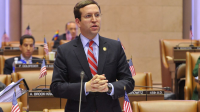NYS Passes Legislation to Thwart Negative Impact of New Federal Tax Law

New York is the first state in the country to pass legislation that will help residents who have been disadvantaged by the new federal tax law that essentially raises state and local taxes (SALT) by imposing a $10,000 cap on federal deductions for both state income and local property taxes.
The updates to the New York State Tax Law can save New Yorkers billions in federal income taxes. Assemblyman David Buchwald (D-White Plains) said in a statement released over the weekend, “We are sending a message to Washington that no longer should the federal government view New York’s economy as a piggy bank to empty for deficit spending and tax cuts aimed at other states.”
The NYS Fiscal Year 2018-19 Budget, which was passed on Friday, contained two policies originally proposed by Assemblywoman Amy Paulin (D-Scarsdale) as stand-alone legislation to provide options for relief for Westchester County residents, who essentially would have seen their NYS taxes go up.

According to Paulin, in 2015, among New Yorkers who itemized their tax returns, the average State and Local Tax deduction was $22,000. Further information published by ATTOM Data Solutions, an organization that collects and distributes information about property including taxes, indicates that 73% of Westchester homeowners pay more than $10,000 in property taxes and many Westchester County constituents are already paying $20,000 or more in property taxes alone.
Buchwald, who served as a tax attorney before his election to the State Assembly, said in an interview on Monday that working with colleagues on the tax code update was like a “flash from the past.”
Buchwald explained that other changes to the state tax code also “restored a bunch of deductions that existed prior to the federal change.”
Some of the federal changes would have put more money into the NYS treasury and others would have benefitted the federal government by as much as billions of dollars, according to Buchwald, who added that any changes in tax law to enhance the state treasury should be made by the state and not the federal government.
The first element of the tax code change, which is applicable to 2018 taxes filed in 2019, is to allow residents to itemize deductions on their state tax return, even if they do not itemize those deductions on their 2018 federal return.
The second element allows charitable contributions to NYS, local governments and school districts to offset local property taxes, which essentially would have gone up 25% to 35% with the new federal tax law, Buchwald said.
The budgets currently being passed by local school districts and municipalities will determine what the property tax rate is. That process remains the same. The state tax code update in essence allows an option as to how that tax bill is paid by residents.
“Charitable contributions, which are still allowed as a deduction by the IRS, can now be made to NYS with an 85% tax credit and to local governments and public schools as an up to 95% credit against your property tax bill,” Buchwald explained. “Local governments and school districts will have to adopt separate local laws, establishing these charitable funds and adopting the charitable tax credit.
Local governments include municipalities as well as county government. “Residents will have to stay on top of their local governments and school districts to make sure these new laws are introduced and passed,” Buchwald said.
Separate from the property tax provision, the state tax code update also set up an optional payroll tax system for businesses to restore deductibility of employee salaries not deductible since the federal $10,000 cap was enacted.
“Essentially, this replaces state income tax withholding with a payroll tax,” Buchwald said. “Employees would still file income tax forms, but the amount owed would go down. The employer should end up transferring to the state the same dollar for dollar amount.”
Employers and business owners will have until December 1 each calendar year to opt into the system. Again, Buchwald advises residents to encourage their employers to look into and adopt the optional payroll tax, which will save individuals money.
In putting the new tax code together, legislators worked closely with academics and tax attorneys. Both Paulin and Buchwald expressed gratitude for the teamwork.
“The biggest challenge was figuring out how to take the academics’ ideas and turn them into legislation that would stand up to the inevitable challenges coming from the IRS,” Buchwald said. “That partnership will continue and grow as other states follow New York’s example. We will work together to defend the new tax codes as challenges come up.”
Because the New York State Tax Law updates were passed just last Friday, Buchwald expects it will take some time for conversations to develop between the affected parties and for information to be exchanged. However, he thinks that New York’s quick action will help area families and businesses plan for the efforts needed to keep their federal tax bills as low as possible.
